23 Jun 22 | News and features, United Kingdom, Volume 51.02 Summer 2022, Volume 51.02 Summer 2022 Extras
Britain’s first LGBT+ Pride march took place 50 years ago, on 1 July 1972. What began as one event in London has since grown into more than 160 Pride events across the UK – from big cities to small towns. Pride has also spread to more than 100 countries, making it one of the most ubiquitous and successful global movements of all time.
How did it all begin?
After the Stonewall uprising in New York in 1969 – when the patrons of gay bars fought back against police harassment – the newly-formed gay liberation movement in the USA decided to organise protests to coincide with the anniversary. The idea spread to the UK, and a group of us in the Gay Liberation Front in London came up with the idea of holding a celebratory and defiant “Gay Pride” march, to challenge queer invisibility and the prevailing view that we should be ashamed of our homosexuality. The ethos of Pride was born.
This was an era of de facto censorship of LGBT+ issues. There was no media coverage of homophobic persecution, no public figures were openly LGBT+ and there were no positive representations of queer people. The only time we appeared in the press was when a gay person was arrested by the police, murdered by queer-bashers, outed by the tabloids, or exposed as a spy, child molester or serial killer.
This is why a Pride march was necessary: to show that we were proud of who we were. But a march was a gamble. Would anyone join us?
Back then, most LGBTs were closeted and dared not reveal themselves publicly, fearing police victimisation. Many aspects of same-sex behaviour were still a crime, given that homosexuality had been only partially decriminalised in 1967. Some were afraid that coming out publicly would result in them being queer-bashed, rejected by family and friends or sacked by homophobic employers.
But, much to our surprise and delight, about 700 people turned out for the first UK Pride in 1972. It was a joyful, carnival-style parade through the streets of London, from Trafalgar Square via Oxford Street to Hyde Park.
We had a political message: LGBT+ liberation. Our banners proclaimed: “Gay is good” and “Gay is angry”. Despite heavy policing and abuse from some members of the public, we made our point.
Buoyed by this first modest success, we had the confidence to organise further Pride marches in the years that followed. They had explicit political demands such as an equal age of consent, an end to police harassment and opposition to lesbian mothers losing custody of their children on the grounds that they were deemed to be unfit parents.

Peter Tatchell in 1974
For most of the 1970s, Pride remained feisty but tiny, with fewer than 3,000 people. However, by the mid-1980s the numbers marching rose to 12,000.
Then we were hit with a triple whammy. First came the moral panic of the Aids pandemic. Dubbed the “gay plague”, it demonised gay and bisexual men as the harbingers of death and destruction. Next the prime minister, Margaret Thatcher, attacked the right to be gay at the 1987 Conservative Party conference. And then, in 1988, Section 28 became law, prohibiting the so-called “promotion” of homosexuality by local authorities – the first new homophobic law in Britain for a century.
The LGBT+ community felt under attack – and we were. It brought us together and mobilised a fightback which was reflected in the turnout for Pride in 1988, with 30,000 marchers compared with 15,000 the year before. The march was angry and political, with some people attempting to storm Downing Street.
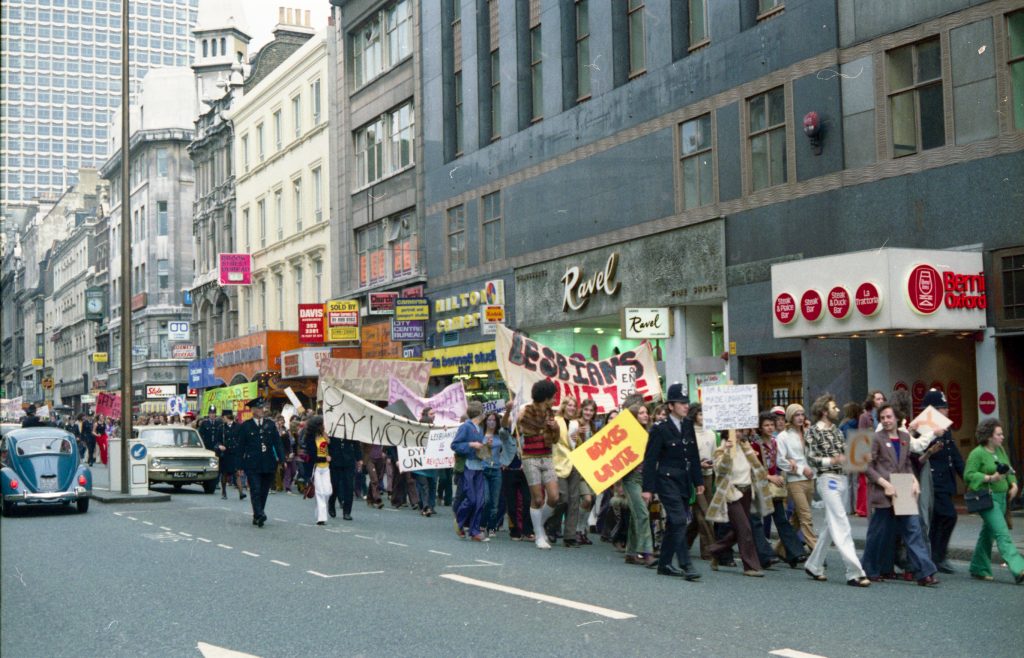
The first ever Pride in London, 1972. Photo: Jamie Gardiner
From 1988, Pride grew exponentially year on year. By 1997, there were 100,000 people on the march and the post-march festival on Clapham Common was attended by 300,000 revellers. This was the high point of Pride, run by – and for – the community, with strong LGBT+ human rights demands.
Since then, it has been downhill. A takeover by gay businesspeople at the turn of the century rebranded Pride as a “Mardi Gras” party and started charging for the post-march festival. Many people felt that Pride had been hijacked by commercial interests. Numbers plummeted, income crashed and the business consortium walked away.
For the past decade, the event has been run by a private community interest company, Pride in London, under contract and with funding from the mayor of London. It has been accused of being not representative of, or accountable to, the LGBT+ community, and of turning Pride into a depoliticised, overly commercial jamboree.
While some business sponsorship may be necessary to finance Pride, there is unease at the pre-eminence of commercial branding and advertising and the way huge extravagant corporate floats dominate the parade, overshadowing LGBT+ community groups.
Critics also question the participation of the police, arms manufacturers, fossil fuel companies, the Home Office and airlines involved in the deportation of LGBT+ refugees. Is this compatible with the liberation goals that inspired the first Pride?
And there is huge resentment that only 30,000 people are allowed to march in the parade, making Pride in London one of the smallest Prides of any Western capital city. Every year, thousands of people who want to march are turned away. This is against the original premise of Pride: that it should be open to everyone who wants to participate.
Pride in London claims that 1.5 million people attend. But there is no evidence to back this claim and it looks like hype to lure advertisers and sponsors. Even if we generously assume that 100,000 spectators line the route and there are 30,000 people in Trafalgar Square and 50,000 in Soho, plus 30,000 marchers, that’s still only 210,000.
Discontent led to last year’s Reclaim Pride march. It reverted to the roots of Pride, with a grassroots community focus, no corporate sponsors, and demands to ban LGBT+ conversion therapy, reform the Gender Recognition Act and provide a safe haven for LGBT+ refugees fleeing persecution abroad – political issues that have been absent from the official Pride for two decades.
It cost only £1,800 to organise, refuting Pride in London’s claims that Pride cannot exist without corporate funding to the tune of hundreds of thousands of pounds.
This year’s Pride in London parade is on 2 July. The day before, on the 50th anniversary of the UK’s first Pride, a handful of surviving Gay Liberation Front and 1972 Pride veterans will retrace the original route from Trafalgar Square to Hyde Park. Among other things, we’ll be urging the decriminalisation of LGBT+ people worldwide – including in the Commonwealth, where 35 out of the 54 member states still criminalise same-sex relations.
As radical and committed as ever, we pioneers of Pride continue the liberation struggle we began half a century ago. There will be no stopping until homophobia, biphobia and transphobia are history.
This article appears in the forthcoming summer 2022 edition of Index on Censorship. Get ahead of the game and take out a subscription with a 30% discount from Exact Editions using the promo code Battle4Ukraine.
23 Jun 22 | News and features, Russia, Ukraine, Volume 51.02 Summer 2022, Volume 51.02 Summer 2022 Extras
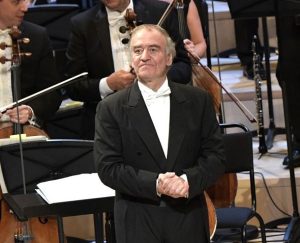
Artistic director of the Mariinsky Theatre Valery Gergiev at the opening of the Zaryadye Concert Hall. Photo: www.kremlin.ru
Since the war started, Ukraine has become a magnet for the global media. As the war has progressed, its voice has become stronger in cultural matters, too. Ukraine has emerged from the shadows of its murderous “brother” and thrust itself into the western imagination, bleeding, yet stoic, full of raw emotion. It stopped being “the Ukraine”. “Kiev” became “Kyiv.”
Western intellectuals and the public suddenly started browsing Wikipedia pages on Ukraine’s history, trying to dissect reasons for its obstinance in the face of the enemy.
The Russia-Ukraine war has many layers. It’s a war of democracy versus authoritarianism. It is a war of blatant propaganda versus principled journalism. It is also a classical colonial war of a metropolis against one of its former subjects. A liberation struggle, extending into the realm of history and culture.
There’s a growing consensus among Ukraine’s cultural elites that this war should become a point of no-return for Russia trying to impose its imperial blueprint on the perception of history and culture of this region, both domestically and internationally.
In the early days of the war, as the first Russian rockets hit the Ukrainian capital, Ukrainian Institute, a young state institution with a mandate to promote Ukraine’s standing in the world through cultural diplomacy instruments, published a manifesto, calling on international partners to stop cooperation with Russia’s state cultural institutions. Similar to weaning itself off Russian energy, the West needs to stop thoughtlessly consuming Russian cultural products, without contextualising them, the Institute said.
As Russian artillery pound Ukrainian cities, London’s leading museums continue feeding the narrative about great Russian culture and history to their audiences. “Fabergé in London: Romance to Revolution”opened at the V&A shortly before the invasion. It profiles “craftsmanship and luxury” of Carl Fabergé, the jeweller of the Russian imperial family. The backdrop of the story is Russia’s imperial history and close ties between both monarchies.
There has since been a pivot. British museums are suddenly showing more willingness towards giving Ukraine agency. London’s National Gallery reviewed its stance on a Degas canvas in its permanent collection, depicting a swirl of dancers in a distinctly Ukrainian traditional attire. “Russian Dancers” became “Ukrainian Dancers”. Tate Modern is currently working on a new exhibition project with Ukraine as its focus, the first of its kind in its history.
Ukraine’s cultural elites and scholars worldwide are determined to seize this moment and to shift the paradigm where imperial hierarchies persist. As it has stood the histories of big countries, mostly former empires, and their cultural figures and phenomena matter more than those of their colonial subjects. This explains why there are so few centres for Ukrainian Studies in the UK (Cambridge being the notable exception), so few translations of Ukrainian literature. No exhibitions in major museums, up until now.
“We cannot cancel Russian culture.” “Pushkin cannot be held responsible for Putin.” “We cannot exclude Russian artists from being invited to residencies and collaborative projects.” “It’s illiberal.” “It smacks of censorship.” These are the arguments often deployed by many intellectuals and creatives in the West. Let us address these concerns one by one.
Placing Russia at the centre of any cultural conversation should not happen without clear articulation of the fact that Russia has used culture for the purposes of aggressive political propaganda internationally. Culture is a broad reflection of the society it represents, and currently Russian society stands largely united behind an ideology promoting violence and blatant untruths.
The new consensus should go beyond the outcome of the Ukraine-Russia conflict and should be about realisation that cultural discourse is unfairly skewed in favour of big and powerful countries, denying many voice and agency. And Ukraine is not alone here.
Our perception of one’s culture is often shaped by a sheer fact of its presence on the cultural scene: through books, theatre productions, films and exhibitions. We often forget that there’s a powerful state machinery propping up this presence and that rogue states – and Russia has become one – weaponise culture and history to political ends, and even use them as a pretext to start a war. To be remembered, the Russian intent behind the killings in Ukraine is to “de-Nazify” the country.
Artists and academics often lack a toolkit to study and bring to the fore cultures previously absent from the discourse. These cultures are absent or underrepresented not for the reasons of uninteresting or lacking value. They are absent because of entrenched cultural hierarchies, intellectual laziness, lack of courage to work with original sources, as well as a long history of suppression of their culture and language by the metropolis.
It is intellectually dishonest and arrogant to place Ukrainian and “good” Russian artists on the same footing by inviting them to speak at the same panel discussion or to apply for funding, for the sake of “reconciliation” and “dialogue”. There can be no reconciliation while the war is still on. It can only start happening after Russia has admitted its guilt and paid reparations for the damage done. Any other framework would mean perpetuation of the colonial discourse.
For another view, read Maria Sorenson’s article as she calls for artists to unite in their opposition to authoritarian regimes and an end to the blanket boycott of Russian culture.
22 Jun 22 | News and features, Statements, United Kingdom
Today, the UK Government presented its new Bill of Rights before Parliament, claiming that it will “restore a proper balance between the rights of individuals, personal responsibility and the wider public interest”. In reality, the new Bill will undermine the universality of all human rights and weaken the ability of courts to give effect to protection of fundamental human rights, including freedom of expression. It will expand state power and hamper efforts to hold the Government to account, joining other legislative measures – such as the Judicial Review and Courts Act 2022 – that have reduced the ability to challenge government overreach.
The Bill is set to replace the Human Rights Act, which has protected human rights and the freedom of expression of people living in the UK for over twenty years.
The Government claims that replacing the Human Rights Act with a new Bill of Rights will strengthen freedom of expression. As human rights organisations that promote and defend the right to freedom of expression worldwide, we unequivocally reject this false narrative. Freedom of expression is too important to be used as cover for weakening the protection of human rights. On the contrary, as detailed in our joint consultation response, the Human Rights Act has bolstered free expression in the UK in a number of areas: strengthened defamation law; enhanced protection of journalistic sources and material; strengthened protection of the right to protest; and restricted perception-based recording of non-crime incidents, among other things.
ARTICLE 19, Index on Censorship and English PEN believe that if the Government is serious about its purported goal to strengthen freedom of expression in the UK, it should instead focus its attention on reforming a number of problematic laws and legislative proposals it has brought forward, including the National Security Bill, the Online Safety Bill, the Higher Education (Freedom of Speech) Bill, the Public Order Bill, and the Police, Crime, Sentencing and Courts Act.

Deputy Prime Minister and Justice Secretary Dominic Raab. Photo: Joe Giddens/PA Wire/PA Images
We urge the Government to abandon any proposal that would replace or weaken the Human Rights Act in any way. Moreover, it must follow the normal procedures for introducing new law – particularly a bill that could have such sweeping repercussions – and allow for proper, thorough democratic scrutiny of the bill. Rushing through such legislation could put the protection of human rights of the people in the UK at risk and fail to offer the levels of protection to which they are entitled, and which the Human Rights Act has already enshrined in law. One of the justifications for the Bill of Rights is to give greater weight to the views of elected lawmakers. By reducing the opportunity for these same lawmakers to scrutinise the Bill, it demonstrates the hollow commitment to democracy and the rule of law that underpins this Bill.
In the letter to Justice Secretary, Dominic Raab, this month, our organisations were among a coalition of 150 organisations from across civil society that called on the Government to provide pre-legislative scrutiny of the proposed Bill of Rights. We warned that the proposal to repeal and replace the Human Rights Act would be a significant constitutional reform, which requires careful and robust consideration. The rights of individuals could be compromised if such a process was hurried.
22 Jun 22 | Afghanistan, Africa, Americas, Asia and Pacific, Belarus, China, Europe and Central Asia, European Union, Hungary, India, Kenya, Philippines, Poland, Russia, Turkey, Ukraine, United Kingdom, United States, Volume 51.02 Summer 2022 Extras
The summer issue of Index magazine concentrated its efforts on the developing situation between Russia and Ukraine and consequential effects around Europe and the world.
We decided to give voice to journalists, artists and dissidents who chose to respond to this ruthless war. At the same time, we didn’t forget other attacks on freedoms that haven’t been covered around the globe as much as they should.[/vc_column_text][vc_custom_heading text=”Up front”][vc_column_text]Joining Ukraine’s battle for freedom, by Jemimah Steinfeld: We must stand with the bold and brave against Putin.
The Index: A global tour of free expression, departing from the poll booth and arriving at the journalists reporting under Taliban rule.[/vc_column_text][vc_custom_heading text=”Features”][vc_column_text]Fifty years of pride and prejudice, by Peter Tatchell: Following the rise and
corporate fall of London’s march for LGBT rights, will grassroots voices rise again?
India’s meaty issue, by Aishwarya Jagani: When a burger comes with a side of oppression.
Cartoon, by Ben Jennings: Art imitates life, caveman style.
My three years of hell in an Uyghur ‘re-education’ camp, by Gulbahar Hatiwaj and Rahima Mahmut: As the world stays silent, hear the truth from inside China’s brutal concentration camps.
One step ahead of the game, by Chen Dan: Media criticism of the Chinese government is all part of the power play.
Welcome to the kingdom of impunity, by Michael Deibert: The landscape is dangerous for journalists in Haiti. Murders and kidnappings are a daily risk.
Politically corrected? By Issa Sikiti da Silva: The banned words the Kenyan
government doesn’t want to hear in this election year.[/vc_column_text][vc_custom_heading text=”Special report: The battle for Ukraine”][vc_column_text]Losing battle for truth in Russian lecture halls, by Ilya Matveev: The war has put a new strain on academic freedom. A Russian lecturer laments his lost classroom.
Don’t be afraid to say two plus two is four, by Mark Frary and Alla Gutnikova: As a convicted student journalist speaks out for freedom, do Russian dissidents once again face the gulag?
Emotional baggage, by Slavenka Drakulic: How it feels to pack up a life in Ukraine and become a refugee.
Back to the future, by Martin Bright: The world has been turned
upside down for Ukrainian reporters, and this is their new landscape.
On not being shot, by John Sweeney: Amidst the Kremlin-wrought
wreckage, do we need a new era of journalism?
Russia’s trojan horse moves closer to Europe, by Viktória Serdult: In Hungary, Putin’s right-hand man and Europe’s right-wing firebrand wins again.
Turkey’s newfound russophilia, by Kaya Genç: Putinism is seeping into Turkey, and it spells trouble for future freedoms.
Divided by age and a tv screen, by Hanna Komar: How do you make sure your
family see the truth when they’re blinded by Kremlin propaganda? A Belarus activist speaks out.
Culture in the cross hairs, by Andrey Kurkov: Decades after Soviet rule, Ukrainian culture is once again under threat, as are the lives behind the creative expression.
Bordering on media control, by Kseniya Tarasevich: False information about
Ukraine finds fertile breeding ground in Poland.
Treat tragedies of the Ukraine war with dignity, by Olesya Khromeychuk: The grieving hearts left behind when death becomes news fodder.
Worth a gamble, by Jemimah Steinfeld: When telling the truth is a crime, turn to a criminal spam operation.[/vc_column_text][vc_custom_heading text=”Comment”][vc_column_text]
Cancel Putin, not culture, by Maria Sorenson: Banning Russian artists assumes
that they are all collaborators of the Russian state and goes against artistic freedoms.
Beware the ‘civilisation’ battle, by Emily Couch: Why Europe must reject
anti-Asian racism to fully stand with Ukraine.
The silent minority, by Ruth Smeeth: A tribute to those whose work never saw the light of day.[/vc_column_text][vc_custom_heading text=”Culture”][vc_column_text]‘The light is no longer the light it used to be’, by Lyuba Yakimchuk: The poet on children being indoctrinated and the elderly disorientated in Russia-occupied Ukraine.
A cassandra worth heeding, by Dominic Cavendish: Murdered Russian journalist
Anna Politkovskaya, whose dispatches from Chechnya should be put in the spotlight.
Poetic injustice, by Stephen Komarnyckyj: History is repeating itself
on the pages penned by Ukrainian writers.
Banking on Russia’s poetic spirit, by Maria Bloshteyn and Yulia Fridman: A “piggy bank” of Russian poetry is fighting on the right side of Putin’s war.
Metaphors and madness, by Eduardo Halfon: In Guatemala, truth is best expressed through fiction.
Metal shows its mettle, by Guilherme Osinski: A heavy metal band labelled
“satanic” by Iran is free from prison and taking back the microphone.
America’s coming crucible, by Jo-Ann Mort: Women in the USA might soon be in the dark about their own bodies.
22 Jun 22 | Magazine, Volume 51.02 Summer 2022
Philosopher and journalist
Afghan football player and director
British-North Korean Conservative Party politician
22 Jun 22 | Events
Join Index on Censorship and Pushkin House for a night discussing freedom of expression in Russia as part of the launch of the latest issue of Index on Censorship magazine.
The 2022 summer magazine looks at how the Russian invasion in Ukraine impacts freedoms within Ukraine and across Europe, Turkey and Russia. While the pages are filled with stories of brave and brilliant people speaking up and out, many write on the growing challenges for freedom of expression. This is especially the case for those living in Russia under Vladimir Putin. This will be the topic of our discussion for the launch.
Featuring a panel of people with direct experience and knowledge of Russia under Putin, the evening will address how much freedom there is in Russia right now, particularly in relation to media freedom and protest.
The panel will include Russian investigative journalists Andrei Soldatov and Irina Borogan, as well as Ben Noble, Associate Professor in Russian Politics at University College London. The conversation will be chaired by Index on Censorship magazine Editor-In-Chief Jemimah Steinfeld. The event will also include a reading of a passage written by the late Russian journalist Anna Politkovskaya, who was murdered in Moscow in 2006.
A wine reception will follow.
This event is free, but seats are limited. Advanced booking is essential. Register for your ticket here.
MEET THE SPEAKERS
 Andrei Soldatov is a Russian investigative journalist, co-founder, and editor of Agentura.ru, a watchdog of the Russian secret services’ activities.
Andrei Soldatov is a Russian investigative journalist, co-founder, and editor of Agentura.ru, a watchdog of the Russian secret services’ activities.
He is co-author with Irina Borogan of The New Nobility. The Restoration of Russia’s Security State and the Enduring Legacy of the KGB (PublicAffairs, 2010), The Red Web: The Struggle Between Russia’s Digital Dictators and the New Online Revolutionaries (PublicAffairs, 2015) and The Compatriots: The Brutal and Chaotic History of Russia's Exiles, Émigrés, and Agents Abroad (PublicAffairs, 2019).
 Irina Borogan is a Russian investigative journalist, co-founder and deputy editor of Agentura.ru, a watchdog of the Russian secret services’ activities. She chronicled the Kremlin's campaign to gain control of civil society and strengthen the government's police services under the pretext of fighting extremism.
Irina Borogan is a Russian investigative journalist, co-founder and deputy editor of Agentura.ru, a watchdog of the Russian secret services’ activities. She chronicled the Kremlin's campaign to gain control of civil society and strengthen the government's police services under the pretext of fighting extremism.
She is co-author with Andrei Soldatov of The New Nobility. The Restoration of Russia’s Security State and the Enduring Legacy of the KGB (PublicAffairs, 2010), The Red Web: The Struggle Between Russia’s Digital Dictators and the New Online Revolutionaries (PublicAffairs, 2015) and The Compatriots: The Brutal and Chaotic History of Russia's Exiles, Émigrés, and Agents Abroad (PublicAffairs, 2019).
 Dr Ben Noble is Associate Professor of Russian Politics at University College London (UCL SSEES) and an Associate Fellow of Chatham House. His research focuses on legislative politics, authoritarianism, and Russian domestic politics, with awards from The Leverhulme Trust, the Political Studies Association, and the British Academy. His co-authored book Navalny: Putin’s Nemesis, Russia’s Future? (Hurst and Oxford University Press, 2021) has so far been translated into eight languages, was selected by the Financial Times as one of the best books on politics in 2021, and has been shortlisted for the Pushkin House Book Prize in 2022. Ben frequently provides commentary and analysis on Russian politics for academic, policy, media, and general audiences.
Dr Ben Noble is Associate Professor of Russian Politics at University College London (UCL SSEES) and an Associate Fellow of Chatham House. His research focuses on legislative politics, authoritarianism, and Russian domestic politics, with awards from The Leverhulme Trust, the Political Studies Association, and the British Academy. His co-authored book Navalny: Putin’s Nemesis, Russia’s Future? (Hurst and Oxford University Press, 2021) has so far been translated into eight languages, was selected by the Financial Times as one of the best books on politics in 2021, and has been shortlisted for the Pushkin House Book Prize in 2022. Ben frequently provides commentary and analysis on Russian politics for academic, policy, media, and general audiences.
 Jemimah Steinfeld is the editor-in-chief at Index on Censorship. Prior to Index she lived in China. She is the author of the book Little Emperors and Material Girls: Sex and Youth in Modern China, and has written for a variety of publications, including The Guardian, The Telegraph, The Independent, CNN, New Statesman and openDemocracy. She can be found tweeting @JFSteinfeld.
Jemimah Steinfeld is the editor-in-chief at Index on Censorship. Prior to Index she lived in China. She is the author of the book Little Emperors and Material Girls: Sex and Youth in Modern China, and has written for a variety of publications, including The Guardian, The Telegraph, The Independent, CNN, New Statesman and openDemocracy. She can be found tweeting @JFSteinfeld.
When: Monday 18 July 2022, 7pm
Where: Pushkin House, 5a Bloomsbury Square, London WC1A 2TA
22 Jun 22 | News and features, Russia, Ukraine, Volume 51.02 Summer 2022, Volume 51.02 Summer 2022 Extras
In the dark times
Will there be singing?
Yes, there will be singing
About the dark times.
Bertolt Brecht, motto to Svendborg Poems 1939
For someone who has by now lived most of my adult life in the West but grew up in Belarus – a country that borders both Ukraine and Russia – these have certainly been dark and turbulent times.
The horror of what people in Ukraine are going through is heart-breaking. It is also confusing if my own country of birth is viewed as an aggressor or a victim.
Should people who have bravely protested in hundreds of thousands in 2020 and paid a very high price for it be now equated to the regime that rules them? Does Belarus, the country and the people, mean Lukashenka? What about Russia? The support for Putin is undoubtedly bigger there. But does Russia and Russian culture mean Putin?
Having always been a passionate advocate of freedom of expression under the most trying of conditions, what to make now of the blanket censorship of Russian and Belarusian artists not in Russia and Belarus… but in the West?
When the horror of the invasion of 24 February sank in, the Western cultural scene was immediately rocked by a succession of cancellations and calls for boycotts. Some of them were easier to understand and justify than others.
Opera singer Anna Netrebko and conductor Valery Gergiev have been tied to Putin’s regime and identified as representatives of his soft power: association with them became too toxic for Western cultural institutions. Recently, the evidence of oligarchic wealth accumulated by Gergiev due to his political connections has also come to light. This made any defence of him even more difficult
Art in some ways has always been held hostage. The authoritarian Soviet regime used the prestige of the Bolshoi and the power of Russian culture as soft power.
One is reminded of a powerful 1968 performance by cellist Mstislav Rostropovich at the BBC Proms in London where he performed - intitally to the calls of protest and with tears streaming down his face - a tortured and impassionate piece of music by a Czech composer Antonin Dvorak on the day Soviet tanks rolled into Czechoslovakia to crush the Prague Spring.
His wife, the opera singer Galina Vishnevskaya, recalled the event in her autobiography:
“In the hall, six thousand people greeted the appearance of Soviet artists with long unceasing cries, stomping, whistling, preventing the concert from starting. Some shouted: ‘Soviet fascists, get out!’ Others: ‘Shut up, the artists are not to blame!’
“Slava (his nickname) stood there completely pale, absorbing the shame for his criminal government, and I, closing my eyes and not daring to raise my head, huddled in the far corner of the viewing box. But then, finally, the hall fell silent. Dvořák’s music poured over the people like a requiem, and Rostropovich, shedding tears, spoke through his cello.
“The hall froze, listening to the confession of the great artist, who at that moment, together with Dvořák merged with the very soul of the Czech people, suffering with him and with them asking his forgiveness and praying for them.
“As soon as the last note played, I rushed backstage to Slava. Pale, with trembling lips, having not yet recovered from his experience on stage, with eyes full of tears, he grabbed my arm and dragged me to the exit:
“‘Let’s go to the hotel, I can’t see anyone.’
“We went out into the street - the demonstrators were shouting there, waiting for the musicians of the orchestra to express their indignation to them.
“Seeing the two of us, they suddenly fell silent and parted in front of us. In the ensuing silence, not looking at anyone, feeling like criminals, we quickly walked to the car waiting for us and, returning to the hotel, we could finally give vent to our despair.
“But what could we do? We did the only thing that was in our power - got drunk.”
What then should the answer to this moral dilemma be? Should musicians and artists be allowed to perform only once they have stated their opposition to their government?
And is it then morally justifiable from the point of view of Western democracies to put someone living under completely different conditions in that position? To demand dissent from someone who might not be in the position to speak freely?
The German music critic Jan Brachmann gives the example of Dmitri Shostakovich, who, in 1949, appeared at a Soviet-backed peace conference in New York, having been pressured by Stalin into attending.
The émigré Russian composer Nicolas Nabokov publicly interrogated Shostakovich about Soviet denunciations of modernist music, even though he knew that his colleague could not speak his mind. Shostakovich muttered, barely audible: “I fully agree with the statements made in Pravda.”
It is unclear what exactly had been gained from that exercise. But Gurgiev aside and any moral clarity there notwithstanding, there have been other, much less clear-cut cases recently.
Sergei Loznitsa, one of Ukraine’s most prolific filmmakers, who has explored the Maidan uprising, the Donbass war, Stalin’s personality cult and the tragedy behind the Babyn Yar massacre, has recently been expelled from the Ukrainian Film Academy for speaking out against blanket boycott of Russian filmmakers.
His opposition is based on the fact that people should be judged by their actions not their passports. It is hard to disagree. People can still love their country and feel deeply ashamed of their government’s actions.
Kirill Serebrennikov, a Russian dissenting artist of great talent, is currently also in the line of fire.
Serebrennikov, who had his homoerotic production, Nureyev, taken off stage at Bolshoi in 2017, was placed under house arrest accused of embezzling theatre funds – a charge widely seen as being politically motivated. He was not allowed to attend a premiere of his production of Cosi Fan Tutte at Zurich Opera nor to the Cannes premiere of his hugely acclaimed ode to rock ‘n’ roll and dissent in 1980s Leningrad, Leto.
Recently Bolshoi has once again cancelled a scheduled production of Nureyev, this time as a retaliation for him speaking up against the war. Serebrennikov told France 24 in an interview last month that “it’s quite obvious that Russia started the war”, and that it was breaking his heart.
“It’s war, it’s killing people, it’s the worst thing (that) ever might happen with civilisation, with mankind... It’s a humanitarian catastrophe, it’s rivers of blood,” he said.
And yet the Ukrainian State Film Agency opposed Serebrennikov’s inclusion in Cannes Film Festival and the premiere of his new film on the grounds that he is a Russian filmmaker, and it was unacceptable in times of war. While this reaction is humanly understandable and can even be seen by some as a moral decision, we need to ask ourselves who ultimately benefits from silencing, cancelling, de-platforming and similar methods? It is never a viewer, a reader or any ordinary person.
The power of art is in our shared humanity and not in division. Art and its healing power is what gets us through the hard and dark times. We need to show solidarity with people in Ukraine and Ukrainian artists, shine a spotlight on their experiences and prioritise their voices, as well as support those who struggle under authoritarianism in their own countries. This is a task for any functioning democracy.
Having started by quoting Bertolt Brecht, another quotation, this time by the Soviet dissident Alexander Solzhenitsyn comes to mind: “The line separating good and evil passes not through states, nor between classes, nor between political parties either – but right through every human heart – and through all human hearts.”
This article appears in the forthcoming summer 2022 edition of Index on Censorship. Get ahead of the game and take out a subscription with a 30% discount from Exact Editions using the promo code Battle4Ukraine.
For another view, read Marina Pesenti’s article where she argues that promoting Russian culture risks furthering Putin's agenda.
21 Jun 22 | Asia and Pacific, China, Hong Kong, News and features

Since the handover of Hong Kong to Beijing on 1 July 1997, the annual march to mark the date became a rallying point for Hong Kong's pro-democracy activitists. Photo: Etan Liam/Flickr
Residents of Hong Kong are going to be given “fortune bags” this month. Millions of people in the city of 7.4 million will receive bags containing a mug, a pen and a fan. The souvenirs will be customised to celebrate 25 years since the handover of Hong Kong from British rule to Beijing rule, which took place on 1 July 1997. This is just one of many planned initiatives to mark the date. Others include the opening of the Hong Kong Palace Museum, modelled on a museum of the same name in Beijing. There’ll be exhibitions, a gala, performances – you name it, they’re doing it. On a less grand scale, an exhibition of photographs from 1997 has been on display at a local Hong Kong art gallery this spring, a collage of smiling faces and waving China flags. A book accompanies the exhibition.
All the initiatives serve to hammer home the message – “this day is a celebration. Do not say otherwise.” The Chinese government is effectively stage managing the 1 July anniversary.
It’s hardly unusual for a state to want to preside over a message of overwhelming positivity. In the UK, we’ve all just emerged from the extravaganza that was the Queen’s Jubilee, a jamboree that sidestepped any of the scandals surrounding the Queen and Royal Family, as well as some people’s misgivings about the concept of monarchy.
But Beijing is going one step further. Not only are they ramping up good stories, they’re papering over the bad. Inconvenient truths are being written out. New Hong Kong textbooks, for example, will say that the city was never a British colony. Instead, the books will teach students the British "only exercised colonial rule" in Hong Kong. Even the police are being made to change their march. According to the South China Morning Post, the Hong Kong Police Force and other disciplined services are being ordered to move in the Chinese “goose-step” fashion at all important events from 1 July, over the current British-style.
Such distinctions might seem curious, even pedantic – “colony” versus “colonial rule”, what difference you might ask? – but they’re in fact highly political. Beijing is suggesting an unbroken line of sovereignty with Hong Kong. Such a narrative criss-crosses with the one it has used in Xinjiang and Tibet, both of which have been denied past independence in order to justify current Chinese control. As George Orwell famously wrote “who controls the past controls the future”. That is China’s aim.
In Hong Kong, Beijing has been building up to this moment for decades, laying the foundations even before the handover took place. Jonathan Mirsky, East Asia editor of The Times in the 1990s, described the situation in Index six months before the handover: news channels reporting on China were doing so in a “vapid or grovelling” manner; organisations were expected to plan celebrations for the handover. He predicted a dire future, and he was right. Freedom of speech and assembly – the core freedoms that underpin democracies – have been whittled away to the point of non-existence. Index has reported on Hong Kong on and off since our creation in 1972. In recent years this reporting has been more “on”.
The passage of the National Security Law in 2020 entrenched the worst excesses of rule by Beijing. It effectively made criticism of government illegal. Protests surrounding the handover that have taken place annually since 1997 have now become too high-stakes.
But we don’t have to play by Beijing rules over here. We can point out that Hong Kong was, in fact, a British colony. That’s not something to be proud of, but it is well established. The rewriting of history is happening with alarming regularity in China (and elsewhere for that matter) and we should call out this worrying trend.
We should also talk about what has happened to freedoms in Hong Kong since 1997. Events like an anniversary are excellent moments to spotlight a cause and concentrate conversations.
Let’s use the 25th year to really raise our voice. In so doing let’s forge connections with those actively campaigning for Hong Kong freedoms, people like Nathan Law and Benedict Rogers and organisations like Hong Kong Watch and the Committee for Freedom in Hong Kong. We have more power when united. Let’s continue to speak up for those who can’t right now because they’ve been silenced – Jimmy Lai, Joshua Wong, Agnes Chow and the many more currently in prison in Hong Kong simply for demanding basic rights. And let’s pressurise our own governments to do the same.
Ultimately people in Hong Kong should be able to commemorate 1 July however they want, be it with great fanfare and fireworks or holding up a poster and shouting out against Chinese government repression. A pluralistic society is one to celebrate, not one that’s afraid of its own history.
17 Jun 22 | News and features, Statements, United States
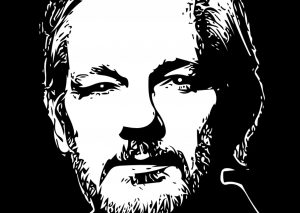
Julian Assange; illustration: Hafteh7
Index on Censorship is seriously concerned about the latest developments in the Julian Assange case. It is deeply disappointing that Home Secretary Priti Patel has approved the extradition of the Wikileaks founder to the United States, where he will face charges under the Espionage Act.
Like Amnesty International, we believe extradition will put Assange at risk and have a chilling effect on journalism around the world. We do not believe he will face a fair trial in the United States given the hostile publicity around the case. His poor mental health puts him in danger of suicide.
Wikileaks published a series of leaked diplomatic cables in 2010 and 2011, which caused serious embarrassment to the United States government. These included the US army manual on the treatment of prisoners in Guantanamo Bay and a video showing a helicopter attack on innocent civilians in Iraq. Julian Assange acted as a journalist and publisher in bringing these disclosures to public attention. He did so in collaboration with a number of mainstream, respected media organisations including the Guardian and the New York Times.
We call on the international journalistic community to support Assange in the next stage of his battle against extradition as he takes his case to appeal. If the US government succeeds in bringing espionage charges against Julian Assange it will have the potential effect of turning all journalists reporting on alleged US security abuses into spies.
16 Jun 22 | Brazil, Opinion, Ruth's blog, United Kingdom
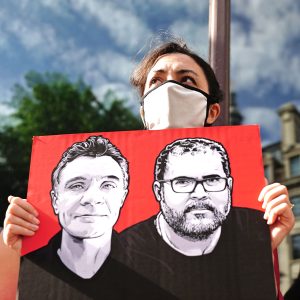
A vigil held for Dom Phillips and Bruno Araujo Pereira. Photo: Victoria Jones/PA Wire/PA Images
On Friday 16 June 2016, my beautiful and kind former colleague Jo Cox was murdered for no reason other than she was doing her duty, representing the people of Batley and Spen as a Member of the British Parliament to the best of her ability. Jo was a democrat, a wife, a mother, a daughter, and a friend to lots of us.
When we lost her, the foundations of our democracy were shaken but her legacy cannot and must never be defined by the heart-breaking and evil events of 16 June. Her family will not allow it, and neither must we.
Having said that I woke up this morning feeling a little sick and very sad. I’m honestly not sure that this day will ever be easy for those people that knew and loved Jo, but as I had my morning cuppa and listened to the news, every story reminded me not of her murder but of how angry she would have been about each news item and how determined and driven she would have been to make a difference. Because that’s who she actually was.
Jo’s legacy is not her murder but her love. It’s not the hate-filled extremist that stole her from us, it’s her determination to leave the world in a better place than she found it. It’s not the silence she left behind but rather the laughter and words she gave us. Which drive so many of us today.
That’s her legacy, which has been embraced by her family and institutionalised by the Jo Cox Foundation. And today as we remember Jo, we cannot forget the instructions she gave us to make the world better.
Which brings me to two more families who are in mourning today – those of Dom Phillips and Bruno Pereira.
Once again two people have seemingly been killed for refusing to be silenced. For refusing to take the easy route. For standing up for those people whose voices aren’t as loud.
Dom Phillips was a brave and inspirational journalist, determined to not only tell the stories of indigenous people affected by climate change but to offer solutions for how we could help save the Amazon. His death in the Brazilian rainforest must not be allowed to define his life or his legacy. He is so much more than the people who have silenced him.
But today my thoughts and prayers are with those who are struggling with their grief – as they seek to make sense of these horrors.
The only words I can give are those of Jo. She left us with one core premise - we have more in common with each other than the things that divide us. Whether that’s across the political aisle, or in every one of our communities, this basic fact of our collectively humanity is something that we must hold onto.
10 Jun 22 | Brazil, News and features
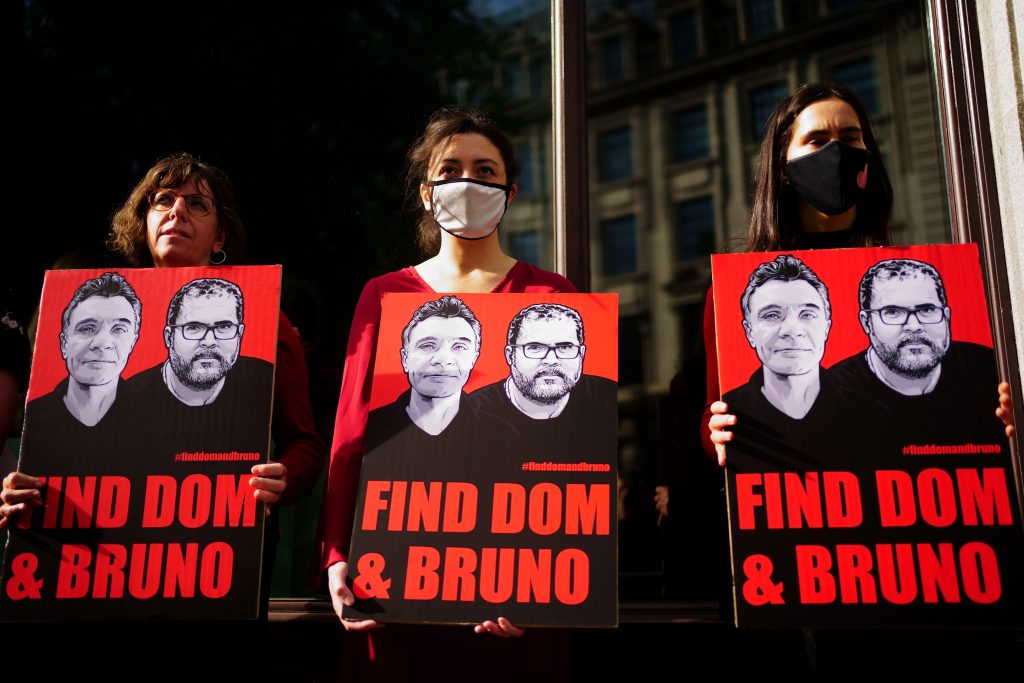
Supporters at a vigil outside the Brazilian embassy in London for Dom Phillips and Bruno Araujo Pereira. Credit: Victoria Jones/PA Images
Another day in Brazil without any news of British journalist Dom Phillips and Bruno Araújo Pereira. The pair have been missing in the Vale do Javari region, in the Brazilian Amazon, since 6 June. They were last seen as they left the São Rafael riverside community, on their way to the city of Atalaia do Norte.
Phillips, a journalist who writes for the Guardian, has lived in Brazil for almost 15 years. Passionate about the Amazon, the largest rainforest in the world, he has travelled extensively in the region, covering, among other subjects, the environmental crisis in Brazil and issues that plague indigenous communities. At the time of his disappearance he was working on a book about the environment, with support from the Alicia Patterson Foundation. Pereira, a long time official of Brazil’s Indigenous rights organisation, is a former employee of the National Foundation for the Indian (FUNAI), an agency of the Brazilian government.
Both were travelling by boat on the Itaquaí River, in the Vale do Javari region, which is close to the border with Peru. Index spoke to Paulo Marubo, executive director of the Union of Indigenous Organizations of the Javari Valley (Univaja), who was one of the last people to see the pair. He said they were there visiting Univaja’s team on the border of the indigenous reserve. On Saturday, they were all threatened by a group of miners and developers, carrying guns.
“Dom even took a photo of these gangs (showing their guns), which got lost with his disappearance, and they left indignant about it. On Sunday they went out and stopped at a village called São Rafael, where they looked for a man called Churrasco to deal with a lake management project. But he wasn't there. After they left, we didn't hear from them anymore,” Marubo told Index.
Marubo said that those at the forefront of indigenous movements often receive threats. He added that the developers feel supported by the current Brazilian president, Jair Bolsonaro, who does not help the indigenous population or protect the lands that are being destroyed. Thus, they operate in a situation where Univaja constantly fight with the state, not just criminal gangs.
“An example of this is Bruno himself, who asked for a license from the current government, which is anti-indigenous,” he said.
In a statement from Tuesday, Bolsonaro, who has not hidden his support of development projects in the Amazon, blamed the missing men rather than the gangs that operate out of the Amazon and make it so dangerous.
“Two people in a boat, in a completely wild region like this, is an adventure that isn’t recommendable for one to do,” he said. “Anything could happen — an accident could happen, they could have been executed — anything.”
The executive coordinator of Univaja has also been targeted by a fisherman, known as Nei, who was interrogated and released by the police after the disappearance of Phillips and Pereira.
In the region where they disappeared, many riverside peoples live, in places that are difficult to access. These areas are rife with crime, such as drug trafficking and illegal deforestation, commanded not only by Brazilians but also by Peruvians and Colombians. All these groups seek absolute control of the region, so the risk to the lives of those who speak out against them or fight for the preservation of the Amazon is high. In Pereira's case, he had already been threatened by loggers and even fishermen.
There are many examples that show the difficulties and dangers that plague the Amazon region. One of the most famous to date is the murder of the activist Chico Mendes, on 22 December, 1988. An active voice in the struggle to preserve the Amazon, Mendes was frequently threatened by powerful local landowners. Three days before Christmas in 1988, when he was getting ready to take a shower at his home in Xapuri, Acre, he was murdered by Darci Alves, who shot him in the chest. Alves was the son of an influential developer in the region.
The murder of indigenous people has sadly become a devastating trend in Brazil recently. In April, the Pastoral Land Commission released a report revealing that 109 indigenous murders were registered in the country in 2021.
At the same time, the situation for journalists is deteriorating. According to the Brazilian Association of Investigative Journalism (Abraji), from 2019 to May 2022 attacks against press professionals grew by 248%. In 2021, 453 attacks were counted, with Bolsonaro being accountable for 89 verbal insults to journalists.
“The situation is worsening. In 2018, when I was reporting on the elections for governor in Rio Grande do Sul (in Brazil’s south) with two other female journalists from a traditional left-wing paper, some Bolsonaro’s supporters approached us trying to see what we were writing, trying to get my badge to look for me on social media, a very hostile atmosphere,” said Filipe Strazzer, a journalist who at the time was working for the newspaper O Estado de São Paulo, one of the most important in Brazil.
“About environmental issues, I wouldn’t be brave enough to report on that. The Amazon is a lawless land, too many risks involved, powerful people who absolutely control it, so it makes me fearful, and you can’t really develop your work,” he said, remembering the famous case of the missionary Dorothy Stang. Born in the United States and with Brazilian citizenship, she was an environmental activist who was murdered in the Amazon, in the state of Pará, in February 2005. At the time, she was being threatened by rich farmers, landowners and loggers.
In the case of the disappearance of Phillips and Pereira, a search is underway. Around 250 people, mostly military personnel with experience in operations in a jungle environment, are participating in the search. Two aircraft, three drones and 20 vehicles are being used, according to Globo’s website.
But Marubo believes that this effort will not be enough to find them and that more needs to be done. The area is dense, difficult terrain and so they need to go into the lakes, into the forests, and not just stick to the main rivers, he said.
“I have asked the federal police to carry out the investigation in this way and not give up because otherwise these bandits will laugh in our face,” said Marubo.
In an open letter initiated by The Guardian and Washington Post, editors from around the world asked that the search be intensified and that the Brazilian government give more priority to the case.
“We ask that you urgently step up and fully resource the effort to locate Dom and Bruno, and that you provide all possible support to their families and friends,” the letter said.
We support this letter. The entire Index on Censorship team is hoping that Dom Phillips and Bruno Araújo Pereira will be found alive and that more priority will be given to promoting and protecting those defending land, and those reporting on it.
10 Jun 22 | Belarus, Brazil, China, Hong Kong, Opinion, Philippines, Russia, Ruth's blog, Ukraine, United Kingdom, United States
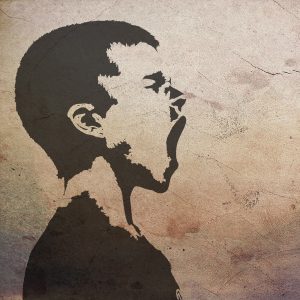
This week has been awful.
The news has been devastating and all consuming. But that feels like it’s becoming the norm.
In Belarus, our friends remain under attack - Andrei and Irina’s trial began on Monday. We have no idea of the outcome.
In Brazil, Dom Phillips and his colleague Bruno Araújo Pereira remain missing – but with reports of fresh blood being found, our hearts break for their loved ones.
In Ukraine, we see daily the death and destruction caused by the Russian invasion, up to 200 Ukrainian soldiers killed a day. And the reports of cholera in Mariupol are beyond my comprehension in the twenty-first century.
In Russia, the crackdown against dissidents continues unabated – with limited coverage. 160 people are currently defending criminal cases for anti-war statements and this week a close associate of Alexei Navalny was tried in absentia and placed on the international wanted list.
In the Philippines, Ferdinand Marcos Jr has been elected as the next President and made his first visit to the US as President-Elect – seemingly the legacy of his parents no longer an electoral or diplomatic issue.
In Hong Kong, six brave democracy protesters were arrested for the temerity of marking the anniversary of Tiananmen Square.
In the US – the inquiry into the Capitol Riot is officially underway – highlighting just how fragile our collective democracy is and how desperately we need to cherish and protect it.
And that’s before I even touch on what is happening in the UK, the ongoing political crises, and the ideologically incoherent approach to freedom of expression protections.
And in too many countries this is now framed through the prism of a cost-of-living crisis as a scale that we haven’t seen for a generation.
My only comfort is that we know what is happening. In a digital age it is very difficult for any leader, however repressive, to completely silence dissent about their domestic actions. The joy of a free press in democratic countries is that it enables us to be informed and to demand more and better – from our own leaders and from those that claim a global role. It enables us to analyse the scale of the threat and to try and prioritise our efforts in assisting those brave enough to stand against tyranny.
Index exists to provide a platform for the persecuted. We work every day with those who refuse to be silenced. The least we can do is listen to them and then join their fight.








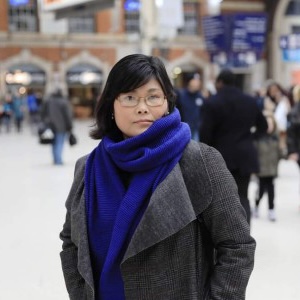
 Andrei Soldatov
Andrei Soldatov  Irina Borogan
Irina Borogan Dr Ben Noble
Dr Ben Noble Jemimah Steinfeld
Jemimah Steinfeld



